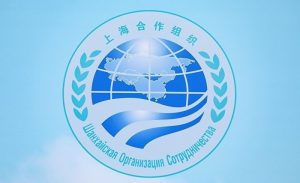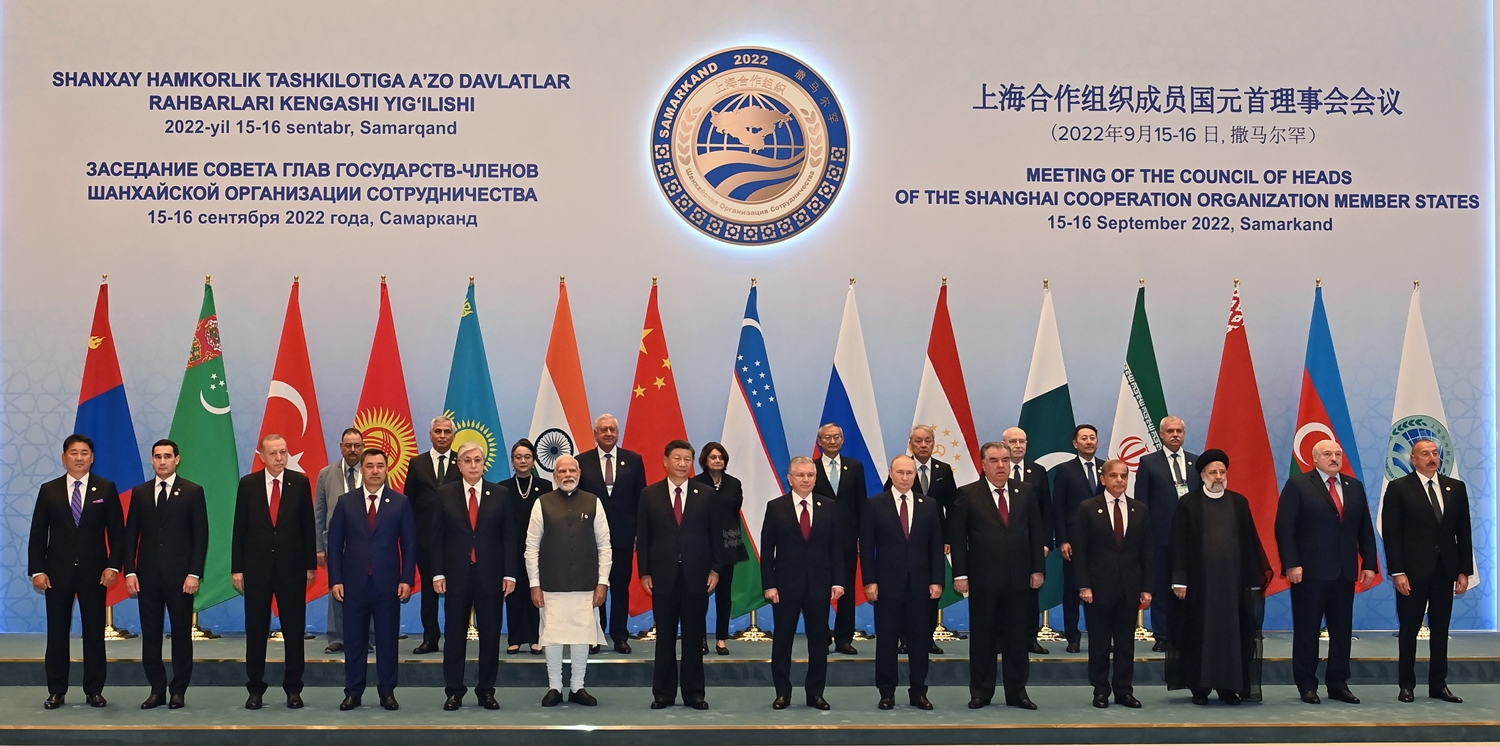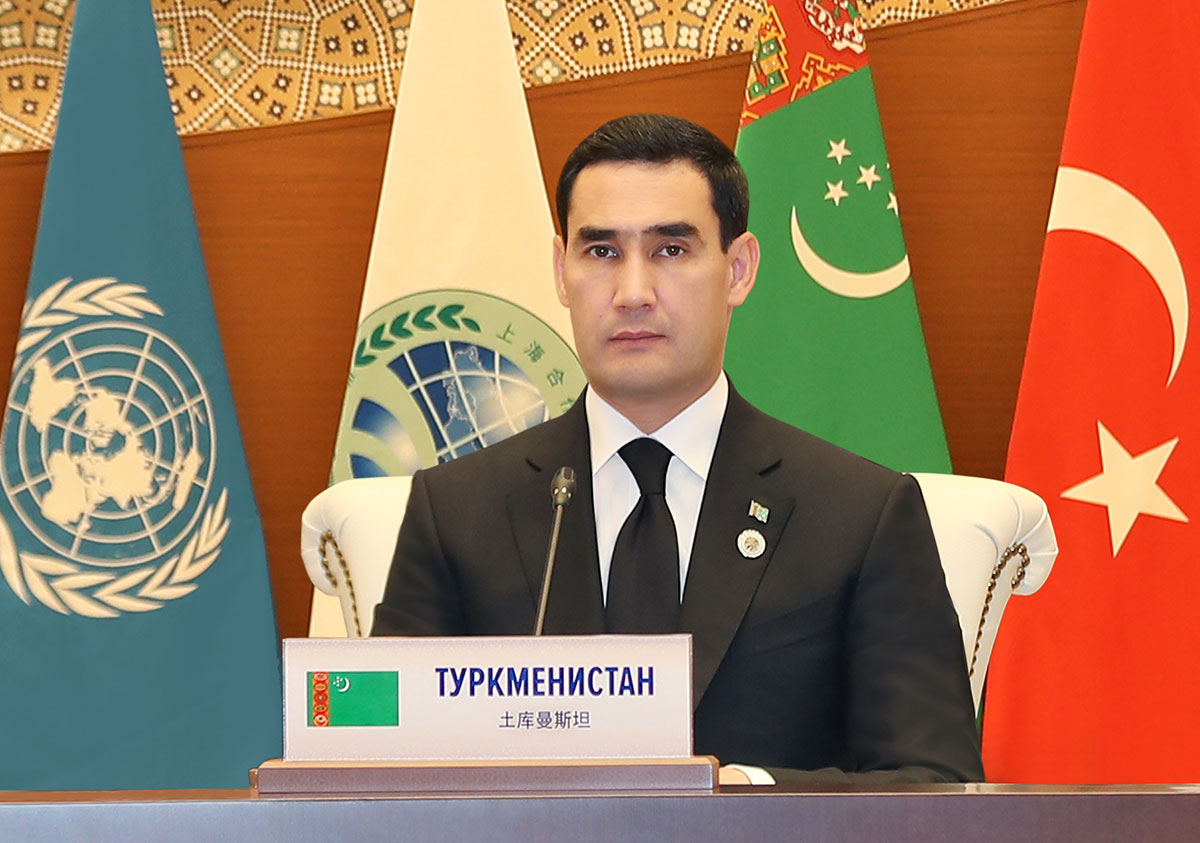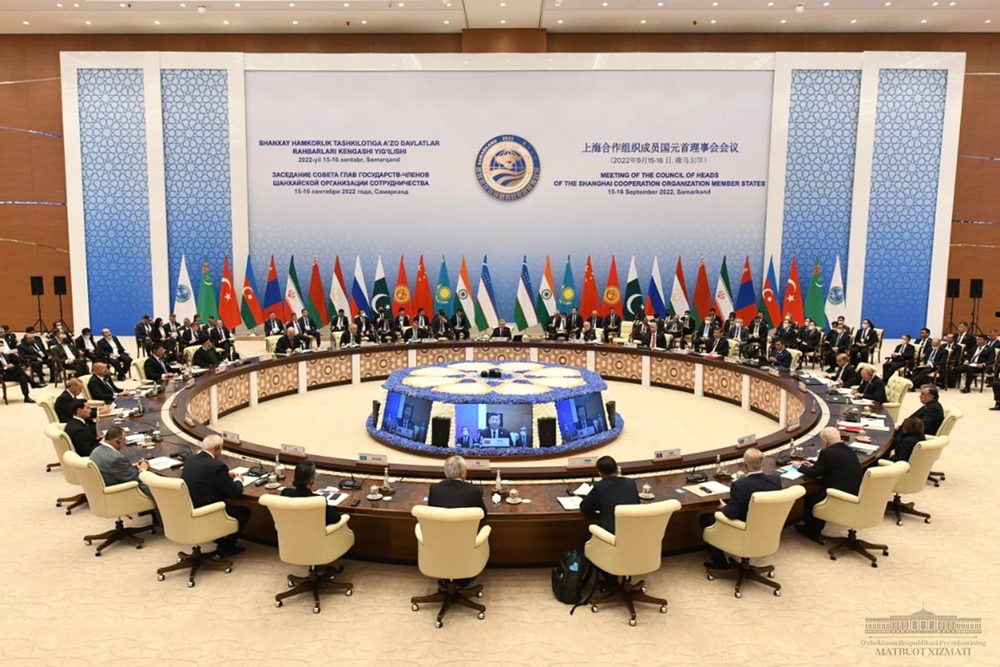nCa Report
On 16 September 2022, Samarkand hosted a meeting of the SCO heads of state under the chairmanship of the President of Uzbekistan Shavkat Mirziyoyev.
For the first time in the history of the organization, the summit was held in such a broad format. The leaders of 14 countries attended the gathering, including:
- Prime Minister of the Republic of India Narendra Modi
- President of the Republic of Kazakhstan Kassym-Jomart Tokayev
- President of the People’s Republic of China Xi Jinping
- President of the Kyrgyz Republic Sadyr Zhaparov
- Prime Minister of the Islamic Republic of Pakistan Shahbaz Sharif
- President of the Russian Federation Vladimir Putin
- President of the Republic of Tajikistan Emomali Rahmon.
The following heads of the SCO observer countries and honorary guests participated in the summit:
- President of Turkmenistan Serdar Berdimuhamedov
- President of Belarus Alexander Lukashenko
- President of Iran Ebrahim Raisi
- President of Mongolia Ukhnaagiin Khurelsukh,
- President of Turkiye Recep Tayyip Erdogan,
- President of Azerbaijan Ilham Aliyev
- UN Under-Secretary-General Rosemary DiCarlo,
- SCO Secretary General Zhang Ming
- Director of the RATS Executive Committee Ruslan Mirzaev.
The expanded meeting was preceded by a meeting of the heads of state in a narrow format.
Following the summit, the leaders signed the Samarkand Declaration and adopted a package of 44 documents.
The approved statements and memorandums focus on boosting intraregional commerce, enhancing the effectiveness of international transportation corridors, encouraging industrial, scientific, and technical collaboration, and introducing cutting-edge technology in healthcare and agriculture.
The chairmanship of the SCO passes to India, where the next meeting of the Council of Heads of SCO member states will take place in 2023.
The SCO family is expanding
Following the summit in Samarkand, Egypt, Qatar and Saudi Arabia have been designated as dialogue partners.
The process has been launched on granting a dialogue partner status to Bahrain, the Maldives, Kuwait, the UAE, Myanmar, Egypt, Saudi Arabia and Qatar.
The procedure for admission to the SCO membership of Belarus, which has observer status, has been started.
Documents Signed
In Samarkand following the SCO meeting, the Council of the Heads of State adopted a number of multilateral documents:
- Samarkand Declaration of the Council of Heads of State of the Shanghai Cooperation Organization.
- Decision on the Comprehensive Action Plan for 2023-2027 on the implementation of the provisions of the Treaty on Long-term Good-Neighborliness, Friendship and Cooperation of the Shanghai Cooperation Organization member states.
- Decision on the Concept of Cooperation of the SCO member states in the development of connectivity and the creation of Efficient Transport Corridors.
- Decision on improving the activities of the SCO
- Decision on the Regulations for the honorary title of “Goodwill Ambassador of the Shanghai Cooperation Organization”.
- Decision on the Roadmap for a gradual increase in the share of national currencies in mutual settlements of the SCO member states.
- Decision on signing a Memorandum of Obligations of the Islamic Republic of Iran in order to obtain the status of a member state of the SCO
- Decision on the beginning of the procedure for admission of Belarus to the SCO.
- Decision of the Council of Heads of State on granting the Kingdom of Bahrain the status of a dialogue partner.
- Decision of the Council of Heads of State on granting the Republic of Maldives the status of a dialogue partner.
- Decision of the Council of Heads of State on granting the Republic of the Union of Myanmar the status of a dialogue partner.
- Decision of the Council of Heads of State on granting the United Arab Emirates the status of a dialogue partner.
- Decision of the Council of Heads of State of the Shanghai Cooperation Organization on granting the State of Kuwait the status of a dialogue partner.
- Decision on the declaration of Varanasi (India) as the tourist and cultural capital of the SCO in 2022-2023.
- Decision of the Council of Heads of State on the signing of a Memorandum between the Secretariat of the SCO and the UNESCO (2023-2027).
- Decision on the Report of the SCO Secretary General on the activities of the Organization over the past year.
- Decision on the Report of the Council of the SCO Regional Anti-Terrorist Structure on the activities of the RATS in 2021.
- Decision on the termination of the Decisions of the Council of Heads of State of the Shanghai Cooperation Organization.
- Statement on actions to respond to climate change (adopted without signing).
- Statement on ensuring reliable, sustainable and diversified supply chains (adopted without signing).
- Statement on ensuring international food security (adopted without signing).
- Statement on ensuring energy security (adopted without signing).
In addition, the following documents were signed during the meeting:
- Agreement between the Governments of the SCO member states on cooperation in the field of tourism.
- Memorandum of Obligations of the Islamic Republic of Iran in order to obtain the status of a member state.
- Memorandum on granting the Arab Republic of Egypt the status of a dialogue partner.
- Memorandum on granting the Kingdom of Saudi Arabia the status of a dialogue partner.
- Memorandum on granting the State of Qatar the status of a dialogue partner.
- Framework for cooperation between the authorized bodies of the member States of the Shanghai Cooperation Organization in the field of trade in services.
- Memorandum between the authorized bodies of the SCO member States on cooperation in the field of museum business.
- Agreement between the authorized bodies of the SCO member states on cooperation in the field of plant quarantine.
- The program of cooperation between the authorized bodies of the SCO member states in the field of renewable energy sources.
- The program of infrastructure development in the SCO space.
- The program of stimulating industrial cooperation between the business circles of the SCO member states.
- The program of cooperation between the authorized bodies of the SCO member states for the development of digital literacy.
- The program of cooperation between the authorized bodies of the SCO member states for the development of artificial Intelligence.
- Roadmap for cooperation between medical organizations of the SCO member states in the prevention and treatment of infectious diseases.
- Action Plan for Scientific and Technical Cooperation between the SCO member states in priority areas (2022-2025).
- Joint Action Plan for the development of intraregional trade.
- Concept of cooperation between the Ministries of Health of the SCO member states in the field of telemedicine.
- Concept of interaction of authorized bodies of the SCO member states in the field of “smart” agriculture and agro-innovations.
- Memorandum between the SCO Secretariat and the General Secretariat of the League of Arab States.
- Memorandum of Understanding between the SCO Secretariat and the United Nations Educational, Scientific and Cultural Organization (2023-2027).
- Memorandum of Understanding between the SCO Secretariat and the Secretariat of the UNESCAP.
- Action Plan for 2022-2025 on the implementation of the Memorandum of Understanding between the SCO Secretariat and the Astana International Financial Center.
Speech by President of Turkmenistan Serdar Berdimuhamedov at the Summit of the Shanghai Cooperation Organization
Dear Heads of State and Government, Dear members of the delegations, ladies and gentlemen,
First of all, let me welcome all the participants of today’s meeting and express gratitude to the President of the Republic of Uzbekistan, dear Shavkat Mirziyoyev for summit’s excellent organization, hospitality and created conditions for efficient work.
Turkmenistan has been invited to the meeting of the Shanghai Cooperation Organization at the highest level as an honorary guest. We consider this high status as an important message, evidence of understanding the great opportunities and prospects in the development of our partnership, the desire to give it a long-term and purposeful character.
Our country fully shares this approach. In our assessments of the SCO’s activities, we proceed from the fact that this organization, based on mutual respect and equality, possessing powerful political and economic potential, has gained high moral authority, is today becoming a pole of attraction for many nations seeking to create a space of peace and stability in Eurasia, mutually beneficial and sustainable partnership.
Our country is ready to cooperate with the Shanghai Organization, to build multifaceted, flexible forms and schemes of interaction in politics, security, economy, trade and investment, in the cultural and humanitarian direction.
Against the background of the current complex processes taking place in the modern world, special responsibility is required, consolidation of states professing the principles of peacefulness, building a common strategy for preserving the global and regional security architecture, preventing confrontation and unhealthy rivalry.
In this context, Turkmenistan, viewing the SCO as one of the crucial pillars of continental stability, expresses its desire and readiness to establish closer and substantive political and diplomatic cooperation, cooperation in such areas as the fight against terrorism, extremism, organized crime, drug trafficking, and other types of illegal activities.
The protection and maintenance of the rule of law, recognized international legal norms, the principles and spirit of the United Nations Charter, as well as its inviolability and irreplaceability, are among the top objectives that we would like to accomplish with the Shanghai Organization. In this regard, I consider it necessary to inform the SCO leaders today about Turkmenistan’s international initiatives at the upcoming session of the UN General Assembly.
Promoting the philosophy of trust–based dialogue in international relations, we intend to initiate the development of a draft resolution of the UN General Assembly “Dialogue is a guarantee of peace”. We are convinced that through the adoption of such a document, the principled and unequivocal commitment of all UN Member States to a peaceful, negotiated way of resolving conflict situations, no matter how difficult they may seem, will be confirmed.
The restoration of a culture of respectful political communication is now gaining universal significance as one of the key conditions for a responsible, non-confrontational approach, the search for opportunities for mutual understanding and maintaining a balance of interests when considering certain problematic points. Based on this, Turkmenistan will submit for consideration by the United Nations General Assembly a proposal to declare 2025 the “Year of Peace and Trust”.
We consider as an important area of our cooperation the use of the combined capabilities of Turkmenistan and the SCO in preventing and neutralizing conflict situations at the regional level, primarily in Central Asia. We highly appreciate the fact that a number of SCO member States and observers have joined the Group of Friends of Neutrality for Peace, Security and Sustainable Development, established at the United Nations on the initiative of our country. I think this provides good prerequisites for advancing the peacekeeping agenda.
The UN Regional Center for Preventive Diplomacy for Central Asia, whose founders include four SCO member states, intends to submit a draft resolution on the Center’s role to the General Assembly in December 2022. This resolution will reflect significant events of the past few years, such as the declaration of the Zone of Peace, Trust, and Cooperation in Central Asia.
We count on the support of these initiatives from the Shanghai Cooperation Organization.
Dear participants,
Turkmenistan is open to a serious expansion and deepening of trade and economic partnership with the SCO. There are not only real opportunities for this, but also an objective necessity. The availability in our countries of a powerful resource and production base, geographical proximity, already acquired competencies and experience of interaction in bilateral and multilateral formats provide today the most favorable conditions for establishing long–term sustainable ties in transport, logistics, communications, energy, the creation of trade and economic integration corridors along the North–South, East-West lines.
Our country is ready to discuss in a practical way the issue of providing its territory and infrastructure in the interests of the SCO for building intercontinental and regional transit routes for the supply of goods and services. We assign an important role to the Caspian route, taking into account the presence of a large modern multi-profile seaport in the city of Turkmenbashi on the Turkmen coast.
We are convinced of the expediency of the SCO’s active participation in the formation of a system of transport and transit corridors and logistics along the China-Central Asia–Caspian Sea–Black Sea line. At the same time, together with the interested parties, we are ready to work together to improve the efficiency of the transport corridor that provides cargo transportation from Russian ports in the Baltic to sea terminals in the Persian Gulf, the Arabian Sea and the Indian Ocean.
In the energy sector, Turkmenistan is also ready for systematic and long-term cooperation with the SCO. We propose to start actively planning joint projects to diversify energy supplies in order to meet both the needs of the SCO states and with the prospect of entering foreign markets. Our country has the necessary resource capacities to significantly increase the volume of such supplies. Over the years, we have accumulated a solid international experience of cooperation in the energy sector. Turkmenistan provides its natural gas to Russia, China, and the neighboring nations while adhering to recognised practices. Today we are actively working on the implementation of the Turkmenistan–Afghanistan–Pakistan–India gas pipeline project.
Here I would like to emphasize the importance of Afghanistan’s engagement in these and other multilateral projects as one of the key factors in restoring its economy and social sphere, and ultimately achieving peace and harmony. We also consider it a priority to provide comprehensive economic and humanitarian support to the fraternal Afghan people.
We advocate a closer and more effective partnership with the Shanghai Organization through private business, creating conditions for regular communication of entrepreneurs.
Culture, science, education, humanitarian contacts – these areas are also on the agenda of cooperation with the SCO. Our countries’ historical relations have deep, centuries-old roots, and Turkmenistan wholeheartedly backs their maintenance and expansion.
In conclusion, I would like to emphasize that close, friendly, fraternal ties with the states of the Shanghai Cooperation Organization have been and remain one of the priorities of Turkmenistan’s foreign policy. We are aware of the great prospects of such a partnership, highly appreciate the level of mutual understanding, trust and openness, good-neighborliness and respect that distinguishes our dialogue with the SCO. We are ready to develop and enrich it. We are firmly committed to establishing long-term, strategic partnership with the Shanghai Cooperation Organization.
SCO Samarkand Declaration is a key final document
Following the SCO summit, the heads of the member states signed the Samarkand Declaration. The 24-page document outlines steps for further cooperation in almost all areas ranging from security issues to the environmental agenda.
At the same time, the Declaration reflects a shared understanding of the emerging realities of the modern world, and the initiatives envisaged in the document are adapted to the ongoing shifts in the architecture of international relations.
Based on the Samarkand Declaration, it can be stated that the general message of the SCO to the rest of the world is that this organization rejects block, ideologized and confrontational approaches to resolving global and regional development challenges.
At the same time, the SCO States reaffirm their commitment to the formation of a more representative, democratic, just and multipolar world order based on universally recognized principles of international law, multilateralism, equal, joint, indivisible, comprehensive and sustainable security, cultural and civilizational diversity, mutually beneficial and equal cooperation of states with the UN serving as the primary coordinating body.
The Shanghai Spirit is also mentioned in the Declaration, which incorporates such principles as mutual trust, mutual benefit, equality, and respect for the diversity of cultures. It is the implementation of these principles that will help create a new model of regional cooperation that makes a constructive contribution to strengthening mutually beneficial multilateral relations in Eurasia.
The SCO heads of state expressed their determination to further develop cooperation in the fields of politics and security, trade, economy, energy, transport, finance and investment, environmental security, tourism, cultural and humanitarian ties.
It is also highlighted that Central Asia is at the heart of the SCO space, and the SCO seeks to strengthen its role in the region’s stability and socioeconomic growth.
The Declaration emphasizes the intentions to consolidate SCO cooperation in the field of security in its broadest and most comprehensive sense. It entails joint information security, cooperation in the fight against terrorism and extremism, drug trafficking.
The parties expressed readiness to further increase cooperation on defense and countering threats to stability.
What does the SCO consider unacceptable in terms of security and the global economic system?
First, the member countries reiterate the detrimental effects on global security and stability of the unilateral and unrestricted buildup of global missile defense systems by some nations or groups of states. Any attempts by them to ensure own security at the expense of the security of other states is inadmissible for SCO.
Secondly, the SCO believes the unilateral imposing of economic sanctions incompatible with the principles of international law will harm third countries and international economic relations. The only exception is the sanctions of the UN Security Council.
In the Samarkand Declaration, the SCO leaders reaffirmed their commitment to peace, joint development and equal relations based on the principles of mutual respect, friendship and good-neighborliness, stressed their intention to continue a constructive and trusting dialogue, deepen effective multifaceted cooperation, make every effort to strengthen security and stability, ensure sustainable development in the SCO space.
The SCO Samarkand Declaration is available here: http://rus.sectsco.org/load/913203/
What the SCO leaders and partners talked about – quotes from speeches
Prime Minister of India Shri Narendra Modi: “We are supporting innovation in every sector. Today, there are more than 70,000 Start-ups in India, of which more than 100 are unicorns. Our experience can also be useful for many other SCO members. For this purpose, we are ready to share our experience with SCO member countries by establishing a new Special Working Group on Start-ups and Innovation.”
President Kassym-Jomart Tokayev of Kazakhstan: “We have to transform the SCO into a global economic platform. Today, our Organization unites dynamically developing economies of the world with enormous human, resource and technological potential. The SCO member states account for about a quarter of the global GDP, that is, more than US $23 trillion. We have at our disposal the richest reserves of energy resources, coal, rare metals and renewable energy sources. There is no confrontational and block intentions in the ideological and institutional foundations of our Organization. This contributes to the growth of the SCO’s international authority and popularity.”
President Xi Jinping of China: “To deliver a better life for people of all countries in the region is our shared goal. The Global Development Initiative launched by China aims to focus global attention on development, foster global development partnership, and achieve more robust, greener and more balanced global development. China is ready to work with all other stakeholders to pursue this initiative in our region to support the sustainable development of regional countries. We need to implement the two statements on safeguarding international energy and food security to be adopted by this summit and better protect energy and food security. China will provide developing countries in need with emergency humanitarian assistance of grain and other supplies worth 1.5 billion RMB yuan.”
President Sadyr Zhaparov of Kyrgyzstan: “Today’s realities dictate the need for effective implementation of joint infrastructure projects to create new international routes for road and rail transportation in the region. In this regard, the construction of the China-Kyrgyzstan-Uzbekistan railway should become a flagship project within the framework of the One Belt, One Road initiative, and its implementation is a significant step towards fully unlocking the transit potential of the Central Asian region with access to world markets.”
Prime minister of Pakistan Shahbaz Sharif: “As you know Pakistan is a neighbouring country of Afghanistan, and peace in Afghanistan will ensure peace in Pakistan. It is Pakistan’s opinion that strengthening Afghanistan in the security and counterterrorism domain should run parallel to the SCO’s socio-economic support to the Afghan people. The international community must support efforts to build a sustainable Afghan economy. Unfreezing Afghanistan’s financial assets remains a crucial need in this regard. For their part, Afghan authorities would do well to build a future based on inclusiveness and respect for human rights for all citizens, especially women and minorities, including effective steps against terrorism.”
President Vladimir Putin of Russia: “Fundamental transformations have emerged in world politics and the economy, and they are irreversible. The growing role of new centers of power is becoming more and more clearly evident, interacting with each other not on the basis of some externally imposed rules that no one has seen, but on the generally recognized principles of the rule of international law and the UN Charter: ensuring equal and indivisible security, respect for sovereignty, national values and interests of each other. It is on these principles, devoid of any elements of selfishness, that the joint work of the SCO member states is being built both in politics and in the economy, which opens up broad prospects for further mutually beneficial cooperation – in politics, economics, cultural, humanitarian and other fields.”
President Emomali Rahmon of Tajikistan: “Over the past two decades, the SCO has managed to build a model of mutually beneficial partnership, the effectiveness of which is ensured by the equality of all member states and consensus-based decision-making. It was stressed that today the Organization faces a responsible task to ensure the sustainable development of the region through joint efforts.”
President Shavkat Mirziyoyev of Uzbekistan: “Despite the fact that our countries are major producers, exporters and importers of agricultural goods and food, we have not yet been able to establish serious cooperation on food security issues at the SCO platform. The potential of our states allows us to consistently provide domestic markets with grain, livestock and fruit and vegetable products, basic types of food, as well as the necessary fertilizers. In addition, we must contribute to solving this problem at the global level. We believe that developing general principles and approaches to ensuring food security is necessary in this regard. It is critical to include specific measures in this document to bring the regulatory framework closer together, conduct joint research, and introduce innovations.”
President Alexander Lukashenko of Belarus: “Belarus is traditionally strong on food security issues. Belarusian agrarians have achieved world-class results in a number of areas of the agro-industrial complex, and the reputation of our products’ quality extends beyond our organization’s borders. We are ready to actively engage in joint work to ensure the food security of our family – the SCO family, including cooperation in the fields of smart agriculture, agricultural innovations, precision farming technologies and resource-saving technologies.”
President Ebrahim Raisi of Iran: “Convergence in the field of energy in the Shanghai Cooperation Organisation will contribute significantly to further economic development and ultimately to the reduction of security and economic costs and stability in the region and beyond. The Islamic Republic of Iran, benefiting from its unique capacities such as 1) proximity to the world’s two largest oil and hydrocarbon fields, that is the Persian Gulf and the Caspian Sea, 2) the oil and gas transportation network and a suitable transit location, and 3) expert manpower, is ready to play an effective role in this area and in order to solve the concerns of the members in ensuring the security of energy supply.”
President Recep Tayyip Erdogan of Türkiye: “With its giant investments in transportation and infrastructure in the past two decades, Türkiye has achieved a great success in this area. Our country’s position as a bridge between the east and the west offers us unparalleled opportunities. With this understanding, we stand ready for cooperation in every area, from security, economy and energy to transportation, agriculture and tourism. We will continue to contribute to the ongoing political and economic processes within the Shanghai Cooperation Organization.” ///nCa, 18 September 2022



